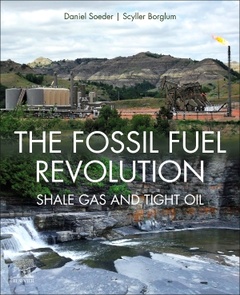The Fossil Fuel Revolution Shale Gas and Tight Oil
Auteurs : Soeder Daniel J., Borglum Scyller J.

The Fossil Fuel Revolution: Shale Gas and Tight Oil describes the remarkable new energy resources being obtained from shale gas and tight oil through a combination of directional drilling and staged hydraulic fracturing, opening up substantial new energy reserves for the 21st Century. The book includes the history of shale gas development, the technology used to economically recover hydrocarbons, and descriptions of the ten primary shale gas resources of the United States. International shale resources, environmental concerns, and policy issues are also addressed. This book is intended as a reference on shale gas and tight oil for industry members, undergraduate and graduate students, engineers and geoscientists.
PART I: GEOLOGY OF TIGHT OIL AND GAS SHALES1. Petroleum geology concepts2. Unconventional tight oil and shale gas resources3. The revolutionary U.S. shale plays4. The evolutionary U.S. shale plays5. International shale plays
PART II. THE FUTURE OF FOSSIL FUELS 6. Environmental concerns7. Energy economics
PART III. ENERGY POLICY8. Energy security9. The politics of energy
Geologists, Geophysicists, Geochemists, Petroleum Engineers, Oil and Gas Industry
Dr. Scyller J. Borglum currently serves as a geomechanical engineer at RESPEC, a consulting and lab testing company in Rapid City as well as State Representative for South Dakota House District 32. She completed her doctorate in Geology and Geological E
- Provides a cross-cutting view of shale gas and tight oil in the context of geology, petroleum engineering, and the practical aspects of production
- Includes a comprehensive description of productive and prospective shales in one book, allowing readers to compare and contrast production from different shale plays
- Addresses environmental and policy issues and compares alternative energy resources in terms of economics and sustainability
- Features an extensive resource list of peer-reviewed references, websites, and journals provided at the end of each chapter
Date de parution : 08-2019
Ouvrage de 354 p.
19x23.3 cm
Thème de The Fossil Fuel Revolution :
Mots-clés :
Australia; Canada; China; Conventional; Cradle to Grave; Crude oil; Development; Direct air capture; Economics; Electricity; Embargo; Energy crisis; Energy; Formations; Fracking; Gas shale; Geology; Global warming; Green New Deal; Greenhouse gas; Groundwater; Hydraulic fracturing; International petroleum; Mexico; Natural gas; OPEC; Paleocene–Eocene Thermal Maximum; Petroleum; Risk; Rock properties; Rooftop solar panel; Shale gas; Shale plays; Shale; Source rocks; Stray gas; Unconventional



